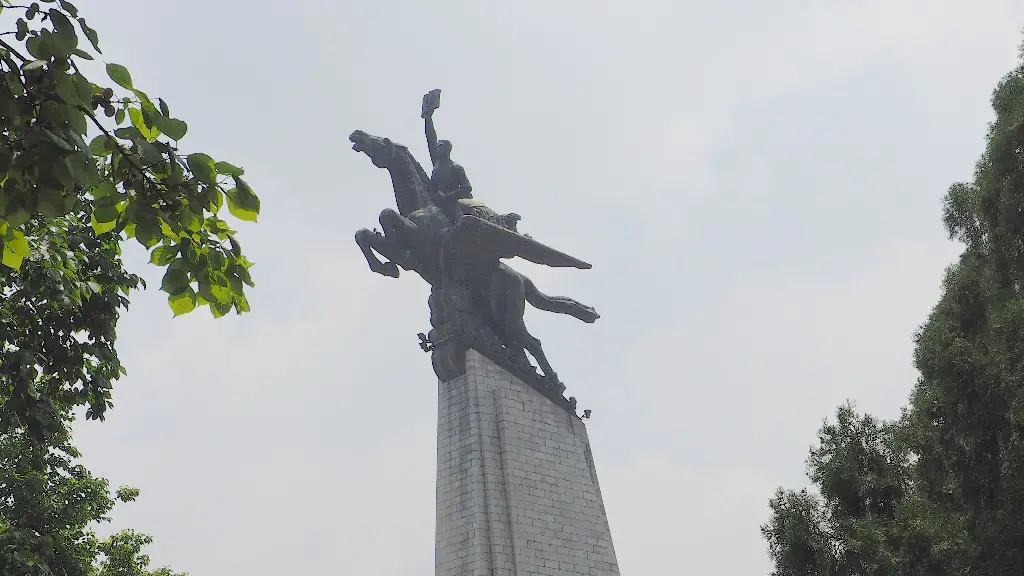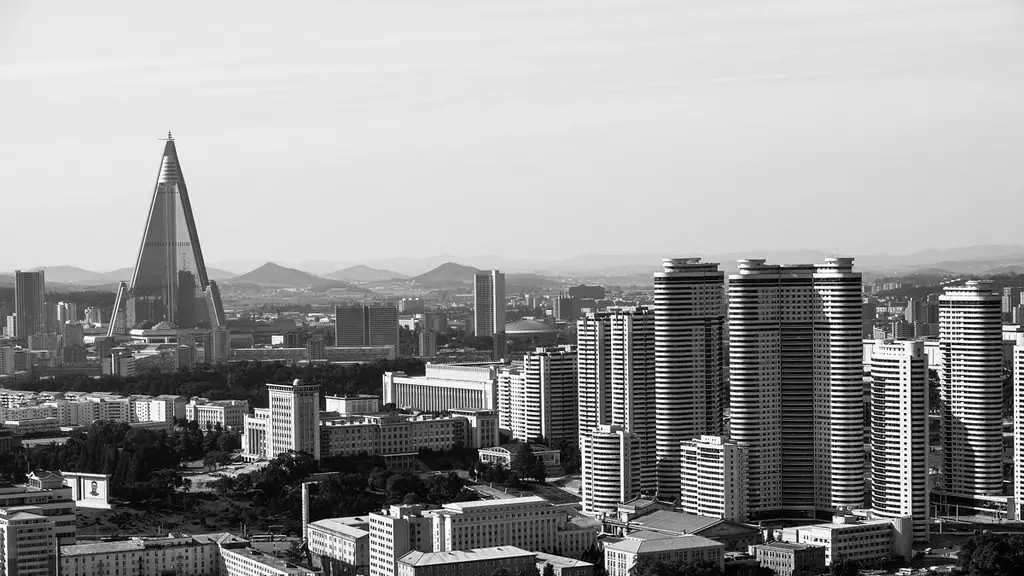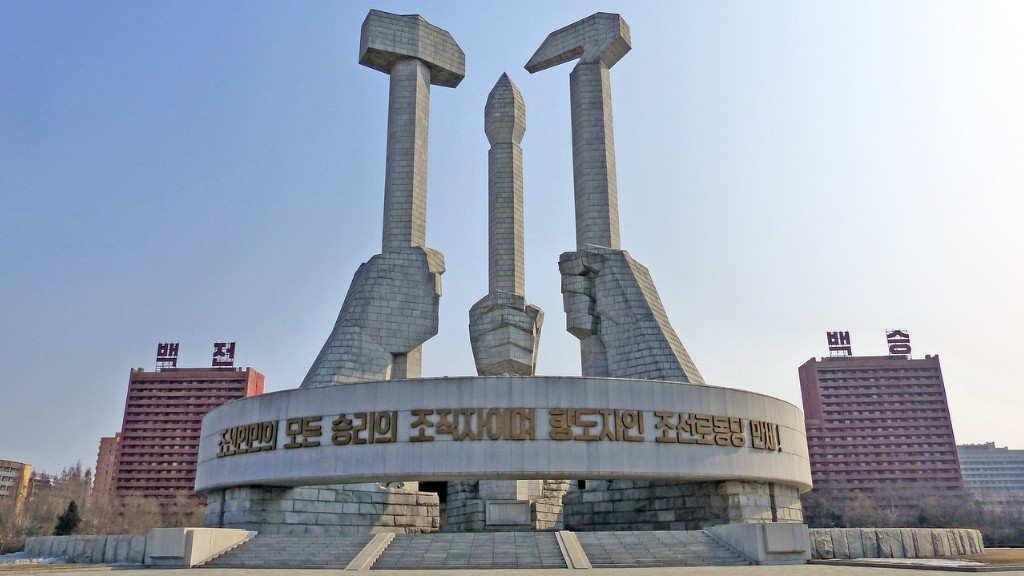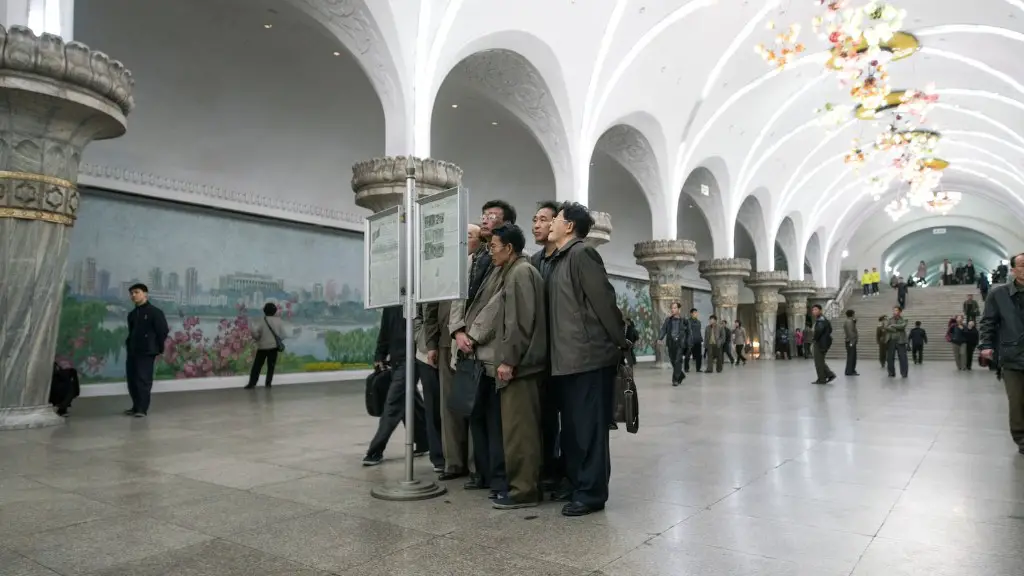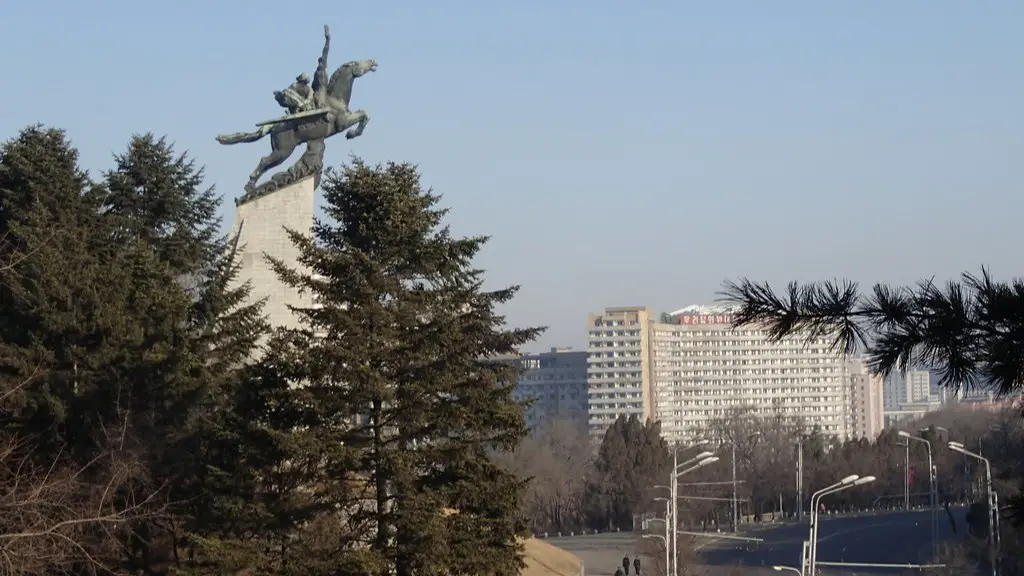North Korea remains one of the most enigmatic, isolated countries in the world, and its government policies have been under scrutiny for decades. Why does North Korea remain such a closed and oppressive state, and what may have been the key factors behind it? There are many theories as to why North Korea has such an intricate and strict set of practices, but none of these theories have been able to provide conclusive evidence of the motivations behind it. It is difficult to determine why North Korea is so wary of foreign contact and influence, or why it is so determined to remain independent from the international community. To gain a better understanding, it is necessary to explore the history, culture, and geopolitical landscape of North Korea, as well as to consider possible instability or insecurity that may have been created by the Cold War.
Trade between North Korea and the rest of the world took a significant toll in the 1990s as economic sanctions were imposed due to the nation’s nuclear program. This resulted in a severe economic downturn, with the government introducing stringent market regulations to prevent economic collapse. The government also resorted to more extreme measures, including the detention of foreign citizens and the suppression of civil liberties. The government also introduced controls over information and media, limiting access to foreign films and media, and controlling what news was deemed “acceptable” to the general public.
Additionally, North Korea’s economy and society is deeply affected by its history. During the Korean War, the country was divided between North and South, and the North became increasingly isolated from the rest of the world. This continued after the war, when North Korea declared itself a communist state, and in spite of its attempts to open up to the world. It was under the rule of Kim Il-Sung that North Korea began to understand itself as a separate nation, distinct from its Southern counterpart.
Geopolitical Environment
The North Korean government is heavily influenced by recent geopolitical developments, and the nation’s economic policies reflect this. North Korea is located in a volatile region, surrounded by some of the world’s most powerful nations. Its neighbors include the US, China, and South Korea, all of which have great economic and military strength. As a result, North Korea is seen as a potential security threat, and the government there is significantly concerned with maintaining its independence and protecting its sovereignty.
American-led sanctions and military pressure have had significant economic and social consequences in North Korea. The government has had to resort to extreme measures to maintain power, and the government’s defensive posture has led to limitations on trade and foreign influence. Although some of these measures have caused economic hardship, North Korea’s leaders seem unwilling to relent to foreign pressure and Western values, as this would mean compromising the nation’s independence.
Political Ideology
The political ideology and national identity of North Korea are psychological factors that have had a major influence on the country’s policies. North Koreans are brought up to believe that their nation is the founder of socialism and is part of a larger ideological struggle against the West. This belief and sense of purpose has led to an intense sense of nationalism, and has created an environment where criticism and dissent are not tolerated.
The government-run media in North Korea also contributes to keeping the nation’s citizens in the dark about what is happening in the rest of the world. Propaganda is used to help maintain control and obedience, while citizens are bombarded with anti-Western rhetoric that demonizes countries like the US and South Korea. The primary goal of the North Korean government is to maintain power and loyalty, and this is accomplished through maintaining a culture of fear, through which individuals are encouraged to obey the state’s rule in order to remain safe.
Military Strength
North Korea’s military strength and nuclear capabilities have been a major concern for the international community. The North Korean government has invested heavily in developing its nuclear arsenal, and the nation’s leaders have demonstrated an unwillingness to negotiate on the matter. Though international efforts to halt this development have been unsuccessful, the unwillingness of the North Korean government to make concessions is indicative of their commitment to pursuing their own agenda.
This commitment to maintaining power has also seen the North Korean government invest heavily in its military capabilities. North Korea’s powerful military forces act as a deterrent to potential foreign interference and contribute to the nation’s isolation from the rest of the world. North Korea is also heavily militarized in order to protect the nation from external threats. Though it is difficult to determine the exact motives behind North Korea’s obsession with military power, it is clear that it is necessary for the nation to maintain its independence.
Regime Survival
Regime survival is another important factor in understanding North Korea’s policies. The North Korean government’s focus on protecting its power has been one of the key factors in keeping the nation’s citizens in check. The government has heavily censored foreign media, limited access to information, and sought to keep citizens and refugees from leaving the country. This has enabled the government to maintain control and remain in power, even in the face of international pressure and economic hardship.
The fear of collapse or revolt among the North Korean population has also been a major factor in keeping the government’s policies in place. Though there have been occasional protests and minor acts of defiance by North Korean citizens, the country has remained relatively stable and unified. The North Korean government’s grip on power has been largely attributed to its policies of censorship, control, and intimidation.
Foreign Relations
Foreign relations have always been a major issue for North Korea, and the nation’s leaders have consistently attempted to distance themselves from the rest of the international community. Though North Korea has attempted to normalize relations with China and South Korea, the government there has largely been unsuccessful in its attempts to gain acceptance from the West. As a result, the nation has remained highly isolated, with few ties to other nations beyond economic aid.
The North Korean government also has a strong interest in avoiding foreign involvement in its internal affairs, as there is a fear of destabilization or intervention. This fear has motivated the nation’s efforts to maintain a high level of control over its citizens and foreign visitors. The international community has consistently pressed for reform in North Korea, but the country has persisted in its stance of independence and sovereignty.
Security Concerns
Security concerns have been a major factor in North Korea’s policies and its distrust of the international community. North Korea is a small and vulnerable nation, surrounded by powerful neighbors and situated near the highly militarized border of South Korea. The North Korean government is aware of the potential for attack and invasion, and this has motivated the country’s policies of independence and militarization.
The United States and South Korea have also had a major influence on North Korea’s policies, as their presence has been largely seen as a threat to North Korea’s regime. This has led to the North Korean government’s aggressive policies, including the development of nuclear weapons, in order to protect its power. The United States and South Korea have also imposed economic sanctions on the nation, furthering its isolation and preventing open trade and communication.
Reconciliation Efforts
The international community has consistently urged the North Korean government to take steps towards reform and reconciliation, but these efforts have largely been unsuccessful. The North Korean government remains committed to its policies of isolation and self-reliance, and the nation’s leaders have consistently repudiated attempts to negotiate. Despite ongoing international efforts, North Korea’s stance towards the international community has remained largely unchanged, and the nation continues to remain highly isolated from the rest of the world.
Though it is difficult to determine the exact motivations behind North Korea’s policies, it is clear that the nation’s leaders are determined to preserve the nation’s independence, security, and power. North Korea’s response to the international community has been consistent and unwavering, though the nation’s leaders are aware of their vulnerability in an increasingly interconnected world. The North Korean government remains committed to its current policies, and it is clear that these policies will not be changing anytime soon.
Internal Struggles
In spite of the efforts of the North Korean government to maintain control, there are pockets of internal dissent that are beginning to surface. The nation’s citizens have become increasingly aware of the government’s policies, and some have expressed dissatisfaction with living in a repressive and isolated nation. There is also some evidence that indicates that the North Korean government is becoming less effective in controlling the population.
The North Korean government’s use of fear and intimidation has been an effective tool in maintaining control, but there is growing evidence to suggest that it is becoming less effective. As the nation’s citizens become more aware of conditions outside of North Korea, they are more likely to question the legitimacy of the government’s rules and regulations. This could potentially lead to widespread internal strife, and has already resulted in a number of protests and confrontations with the authorities.
Changes Ahead
Though the North Korean government remains committed to preserving its sovereignty and power, it is clear that there are a number of changes ahead. The international community is increasingly pushing for reform and reconciliation in the nation, and some of the nation’s citizens have begun to question the legitimacy of the government’s policies. The North Korean government is also aware of its vulnerability and the potential for internal dissent, and this could lead to more open communication and dialogue with the global community.
Though it is impossible to determine exactly when or how North Korea’s policies may change, it is clear that the nation is at a critical crossroads. North Korea’s government is under significant pressure from both its citizens and from the international community, and it is likely that some sort of change is in the near future. Whether that change will lead to more open communication and cooperation with the rest of the world, or will cause further isolation, will depend on the nation’s ability to assess its challenges and respond accordingly.
